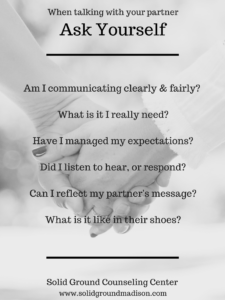If you are interested in what it looks like to begin building better communication with your partner, you are in the right place! Relationships, although deeply rewarding, are hard work. Contrary to the fairy tale scenes today’s movies and shows depict, partnerships with our significant other take work – do not get discouraged, there is good news here!
Communication deficits remain one of the top reported relationship issues. Often, after multiple attempts at conversations that go awry partners begin to assume they are incompatible, or that the other person does not care. While this can be incredibly frustrating, it tends to be largely untrue. When we think about how different our communication styles from our families of origin are, it is understandable to see how we end up in conversations that go around in circles.
Something I have learned in life, as well as my professional career is that it is ok to argue or disagree. Conflict (i.e. not having the same perspective) is 100% alright, and honestly a healthy part of relationships. Disagreement allows us an amazing opportunity to stretch ourselves and learn about our spouse, as well as teach them about us. If this seems far-fetched or impossible because communication is a struggle in your relationship, I can completely understand. I HAVE BEEN THERE! However, I can assure you it is true. As with any area we are looking to improve, purposeful effort to update our communication patterns can result in an increase in satisfaction concerning this area of our relationship. The following are rules I use in my relationship, as well as teach couples in my practice. I am so excited to share them with you here.
1. Communicate clearly and fairly.
I imagine that most of us can think of an example of when a conversation that we had with our spouse just went downhill fast. Every time that we have an exchange of this nature it creates a connection in our brain that says “this type of conversation is not effective”, “this topic is not safe to talk about”, or even “my spouse is unwilling to resolve this with me”. Anybody been there? Communicating fairly and clearly helps conversations proceed in an effective, productive manner. Assuming the best of our partner rather than filtering everything they say as a personal blow facilitates an atmosphere of fair communication. So, how do we actually communicate clearly and fairly? Keep reading!
2. Determine what it is that you really need.
If you think about it, how are you going to help your spouse understand what you need if you cannot explain it to yourself? It is unfair to expect our partner to read our mind (if you are like me, you may need to read that again). Perhaps you are familiar with the type of conversation that begins with you asking or telling your spouse one thing, but then spirals out of control after you have requested or gone off about 9 other things. Doing a heart check to determine what you need BEFORE you bring a conversation or request to your spouse will ensure you are able to effectively communicate what you actually need.
3. Manage your expectations.
Have you ever had an exchange with your spouse that you ended up with you being upset due to them not meeting your expectations? When you think about that situation, did you go into that conversation expecting something from them that was never expressed? As previously mentioned, our partners are not mind-readers. If we need something from them, we need to talk about it. Having expectations of our spouse, especially those that are uncommunicated, leads conversations into disaster more times than is necessary. Also, it is important to ensure that the expectations we have of our spouse are appropriately theirs. By this I mean, we cannot expect our spouse to determine our self-worth. We cannot expect our spouse to be our source of joy. These are not their roles. Expecting our spouse to be responsible for these things will leave you repeatedly disappointed. Taking responsibility for those areas of our life takes the pressure off our partner to fulfill the roles they were designed to do!
4. Listen to hear, not to respond.
One of the most hurtful things that can happen in a conversation is to have poured your heart out or said something important only to have your spouse respond in a defensive manner, or not even hear what you said. When we listen to hear we use active or reflective listening. Active listening is when we listen to hear what the speaker is saying rather than listening to respond. Specifically you are listening to hear what they are communicating and why (or the emotion behind it). Although it takes a bit of practice, it is a highly effective tool for communicating.
5. Reflect what you heard to ensure you understood.
This is the second part of listening to hear. Reflecting back what you heard ensures that you understood what your spouse was saying. It also gives them the opportunity to steer you back on course when you hear something that was not their intent to communicate. Having discussions in this manner ensures that you do not assume something based on misheard information. There is very little room for misunderstandings when a conversation contains two active listeners 😉
6. Put yourself in their shoes.
Would you want your spouse to treat you or speak to you the way that you speak to (or about) them? Affording our partner dignity and respect in conversations sets the tone for how the situation can turn out. If we would not enjoy being spoken down to, disrespected, or cut short, we need to avoid speaking to our partner this way. This can be a difficult habit to break, but is an absolute game changer for productive conversations!
That is it, easy peasy, right? Kidding. If all this seems overwhelming, I suggest you begin with #2. Going into a conversation with knowledge about what you are asking for, or needing from your partner is key. If you are to be the listener because your spouse has brought something to you – than hone in on #4/5. While these techniques work best together, it is not worth stressing yourself out over perfecting them before your next conversation. Like any good skill in life, good communication skills are learned during practice. Good luck, and happy conversations!

